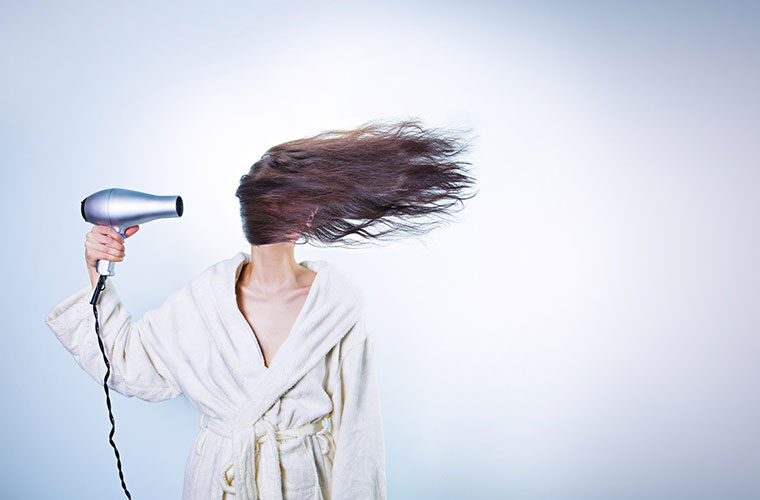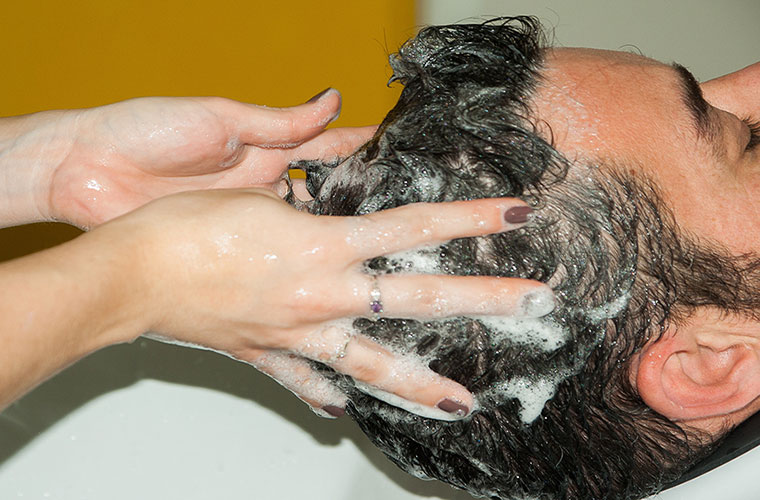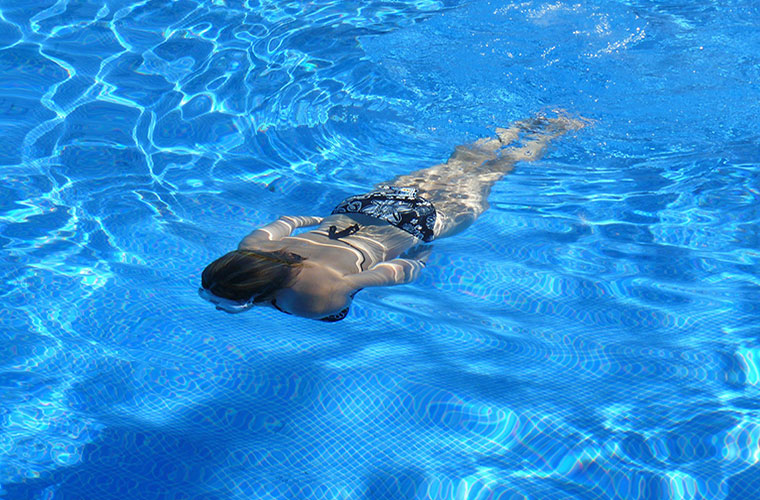Healthy hair looks great, feels great and can need minimal maintenance. However, if you are suffering from damaged hair and noticing split ends, discolouration or even hair loss, the experience can be upsetting. The good news is that, although there are several factors that can do daily damage to your hair, for most of these there are also some simple solutions.
Whether you are worried about your hair care regime or concerned about the impact your activities or environment are having, we have six common factors, which could be doing daily damage to your hair without you even realising it.
Swimming
Unless you are lucky enough to be able to swim regularly in fresh water, you will find that swimming either in seawater or in a chlorine-treated pool will cause some hair damage, even to healthy hair. If you have a choice, you can opt for a low-chlorine pool treatment but there are also other steps you can take towards healthy hair.
Soaking hair with tap water before swimming can stop it from absorbing too much chlorine, as can coating it with olive, argan or coconut oil. If you do a lot of swimming outdoors, you might want to consider UVA sun protection to keep your hair healthy and in tiptop condition.
Hair Styling and Hair Products
We aren’t always very kind to our hair and, if your hair care regime includes regular blow-drying, the use of straighteners or excessive brushing, you might be causing hair damage without realising it.

It is worth remembering that wet hair is more brittle than dry hair and should be treated kindly and handled as little as possible. Over-brushing is something else to be avoided and, if you can cut out at least some of your regular blow-drying, you will be increasing your chances of having healthy hair.
Another issue can be the over use of strong-hold hair products as these can make hair tricky to brush or comb and cause breakages. There are certain chemicals in shampoos that make your hair shiny but can also cause damage to healthy hair. As a rule of thumb, the more natural your shampoo is, the less likely it is to harm your hair.
Hormones
If you have experienced hair changes during pregnancy, you might not be surprised to find out that hormones can have a big impact on otherwise healthy hair. When a woman goes through the menopause, she experiences a change in balance between the testosterone and oestrogen in her body.
When the relative level of testosterone increases, this can cause thinning or damaged hair. Hormone replacement therapy under the advice of your doctor can help to keep your hormonal balance steadier during the menopause.

The stress hormones such as cortisol can have an impact on healthy hair because they divert blood away from hair follicles to other areas in the body that are stimulated by natural ‘flight or fight’ responses.
Long-term stress can cause hair damage and increase shedding rates. Regular exercise and a good work life balance can help to reduce stress and improve the condition of your hair.
Weather Damage
In very hot or very cold weather, it isn’t so much the weather that has a negative impact on healthy hair as the way we treat our hair in adverse weather conditions.
One factor that causes hair damage in the winter is swapping from the cold outside to very warm indoor temperatures, leaving the scalp more likely to suffer from dehydration. During the summer months, swimming and sunrays can both have a negative impact on your hair.

There are hair products that can help reduce hair damage caused by the weather but hair care regimes that keep hair regularly trimmed and reduce blow-drying, and styles that involve tying your hair back, will protect you from weather-related hair damage.
Medical Conditions
Healthy hair can often be linked to general good health but there are some medical conditions that can specifically contribute to hair loss and damage.
Autoimmune diseases develop when your body’s immune system mistakenly identifies healthy cells as foreign ones. In the case of alopecia areata, the hair follicles are attacked, causing patchy hair loss. Alopecia areata is difficult to treat but hair regrowth can occur in some people.
Thyroid problems such as hypothyroidism (where thyroid levels are low) can cause higher than normal levels of hair damage and hair loss. This is because of the key part your thyroid gland plays in keeping your body generally healthy.
As part of your hair care program, sticking to a healthy diet with a balance of vegetables and plenty of water can help keep your thyroid functioning normally. Although pregnancy isn’t strictly speaking a medical condition, the hormones that your body produces when you are pregnant can sometimes make your hair thin and even fall out.

This isn’t true for every woman and the good news is that, once your hormone levels have returned to normal after giving birth, your damaged hair will go back to its usual pattern of growth and shedding.
Hard Water and hair damage
If you live in a hard water area such as Suffolk, you will know that the high levels of minerals in hard water can leave scum marks on glasses and taps and reduce the effectiveness of shampoos and soap products.
What you might not realise however, is that calcium and magnesium, which occur in disproportionate amounts in hard water, can create a film on individual hair shafts and result in tangled and damaged hair.
Whilst there are a few home remedies, such as lemon juice and vinegar that can temporarily solve this problem, by far the best way to reduce damage to your hair from hard water is to invest in a water softener system.
Water softeners can be small enough to be fitted under your kitchen sink, treat water as it enters your home and, as well as contributing to healthy hair, have a lasting impact on energy bills, eczema, cleaning product consumption and the life of appliances.
Hart water provides independent water softener services all over East Anglia and offers a complete installation and maintenance program over a wide range of products.
We offer competitive pricing on a range of filters, taps and water softeners including installation, service and repair. Get in touch today for a free survey and experience the freedom and benefits of softer water to your home.
- UK Water Softener Regulations and Safety Standards: What Every Property Owner Needs to Know in 2026 - December 10, 2025
- Electric vs Non-Electric Water Softeners: A Complete Guide for UK Homeowners and Property Managers - October 23, 2025
- A Water Filter for Home Use vs Bottled Water: Which is Better for UK Households? - July 11, 2025

